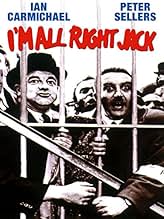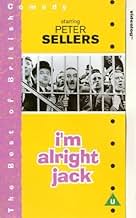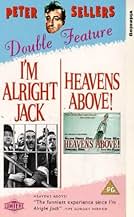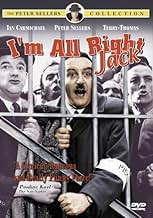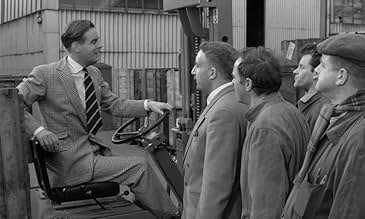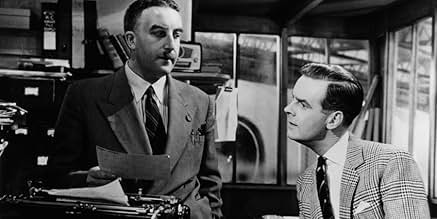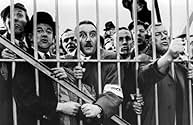CALIFICACIÓN DE IMDb
7.1/10
4.6 k
TU CALIFICACIÓN
Agrega una trama en tu idiomaA naive aristocrat in search of a career becomes caught up in the struggles between his profit-minded uncle and an aggressive labor union.A naive aristocrat in search of a career becomes caught up in the struggles between his profit-minded uncle and an aggressive labor union.A naive aristocrat in search of a career becomes caught up in the struggles between his profit-minded uncle and an aggressive labor union.
- Dirección
- Guionistas
- Elenco
- Ganó 2premios BAFTA
- 3 premios ganados y 1 nominación en total
Dennis Price
- Bertram Tracepurcel
- (as Denis Price)
Opiniones destacadas
I was quite surprised with this film, not because of liking it (I did), but just how much union politics the Boulting Brothers put on their sleeve with working on this movie. I have been in a Union business that failed before, and I was quite shocked at how much I could compare my own experiences with what was on display here with the Unions and Management trying to maneuver themselves ahead of on another. While Peter Sellers does put on a great performance, this really is Ian Carmichael's movie. I hadn't seen any of his work, and this was a great introduction. All of the other cast is great as well. One final note, it probably contains the most annoyingly catchy title song ever, it'll probably haunt your cranium for days.
The cast alone is a triumph in this movie - some of the best British character actors who ever lived are here: Terry Thomas, Miles Malleson, John Le Mesurier, all backing up Ian Carmichael as the earnest, silly-ass upper-class bumbler and Peter Sellers as Fred Kite, the Marxist shop steward. Sellers in particular is wonderful; his Fred Kite is a lower class striver who has acquired just enough education to give him an inflated idea of his own abilities, but not enough to realize the gaps and inadequacies in his views. He is a perfect realization in miniature of Taine's statement that there is nothing more dangerous than a general idea in a narrow, empty mind. He boasts to his Oxford-educated gentleman lodger about the summer course he took at the university once, reminding him in a familiar fashion about the very good marmalade and toast provided by the college, while the obviously wealthy young man politely admits that he wasn't acquainted with the public dining hall during his years there.
The plot becomes more and more complex as the movie progresses, with almost everyone turning out to be on the take. The climax comes in a free-for-all over a bag containing thousands of pounds intended to bribe Stanley into joining the sensible schemers plundering the public while paying lip service to public service and solidarity with the working class. Malcolm Muggeridge has a interesting cameo in this scene, playing himself. Most recent broadcasts of this movie have edited out the disturbing racist statements of the working class characters, but the original movie had no sentimental soft spot for anyone, workers or bosses.
The plot becomes more and more complex as the movie progresses, with almost everyone turning out to be on the take. The climax comes in a free-for-all over a bag containing thousands of pounds intended to bribe Stanley into joining the sensible schemers plundering the public while paying lip service to public service and solidarity with the working class. Malcolm Muggeridge has a interesting cameo in this scene, playing himself. Most recent broadcasts of this movie have edited out the disturbing racist statements of the working class characters, but the original movie had no sentimental soft spot for anyone, workers or bosses.
Superior example of British comedy film making amongst a sea of duds. British film-makers never got it more right than here. Tremendous story and script plus wonderful performances from a whole host of character actors, especially Peter Sellers and Terry-Thomas.
Very funny satire on British industrial relations.
Very funny satire on British industrial relations.
Ah, progress. Never mind that tosh. "I'm All Right Jack" is a hilarious send up of the 20th century very much on point today, an anything-goes capitalist-meets-socialist system where workers and owners are equally victimized.
Peter Sellers won the British Academy Award for Best British Actor for his performance as union leader Fred Kite, beating out a field that year which included Laurence Olivier, Laurence Harvey, Richard Burton, and Peter Finch. Ian Carmichael is the actual lead actor in "I'm All Right Jack", and Kite doesn't even show up until after the first 20 minutes, but Sellers makes Kite a compelling and comedic character worth remembering as a symbol of organized labor run amuk.
A kind of sequel to "Private's Progress", also featuring Carmichael in the role of Stanley Windrush, "I'm All Right Jack" is a swinging social satire. Two factory owners (played by Dennis Price and Richard Attenborough) conspire to create a labor strike at a munitions factory to get a higher price. To do that, they need someone to create a bit of friction. Enter Windrush, a total innocent upper-class twit who only cares about earning his pay, no matter how much that offends Kite and other labor leaders.
"We're living in the welfare state," says the middle manager Hitchcock (Terry-Thomas). "I call it the farewell state."
"I'm All Right Jack" starts out very cheeky indeed, with a surprising eyeful of female nudity circa 1959 and cracks at religion and the military. Later, a stuttering character sees an array of photographers and asks: "Why don't you tell them to f-f-f-photograph something worthwhile."
The only major problem with "I'm All Right Jack" is the slowness of the film right up until Windrush arrives at Missiles Ltd., after which the comedy becomes a kind of classless class comedy, where shrapnel flies thick and fast and no one is immune. Sellers' performance is brilliant, giving you a character who's likable even as he plays the antagonist. You can scorn his love of Stalinist Russia, which he boils down to cornfields and ballet, but you empathize with his fairness (not wanting to fire Windrush is his undoubted downfall) and his sensitivity for the feelings of Mrs. Kite (Irene Handl) and their daughter (Liz Fraser). He's just a bit extreme.
"We cannot and do not accept the principle that incompetence justifies dismissal," Kite argues. "That is victimization."
The real bad guys are the bosses guying the system, though John Boulting, who directed and co-wrote this with Alan Hackney and Frank Harvey, wants you to see the union abuses that make such a scam not only possible but desirable to the upper classes.
Sellers also appears at the film's outset as "Sir John", a men's-club inhabitant who witnesses the end of World War II as an unpleasant upending of the old social order, before disappearing in the postwar wake. "A solid block in what seemed the edifice of an ordered and stable society," is his postscript.
Contrast him with the very hip, 60s-sounding Al Saxon theme song that sticks its post-war, pre-Beatles attitude in your face as smartly as flipping the bird to Churchill (something else we get to see in the first few minutes), and you find yourself watching what had to be for 1959 a very mod film. It still stands up today as one of the best labor-management comedies, even if the British class system it addresses is no more.
Peter Sellers won the British Academy Award for Best British Actor for his performance as union leader Fred Kite, beating out a field that year which included Laurence Olivier, Laurence Harvey, Richard Burton, and Peter Finch. Ian Carmichael is the actual lead actor in "I'm All Right Jack", and Kite doesn't even show up until after the first 20 minutes, but Sellers makes Kite a compelling and comedic character worth remembering as a symbol of organized labor run amuk.
A kind of sequel to "Private's Progress", also featuring Carmichael in the role of Stanley Windrush, "I'm All Right Jack" is a swinging social satire. Two factory owners (played by Dennis Price and Richard Attenborough) conspire to create a labor strike at a munitions factory to get a higher price. To do that, they need someone to create a bit of friction. Enter Windrush, a total innocent upper-class twit who only cares about earning his pay, no matter how much that offends Kite and other labor leaders.
"We're living in the welfare state," says the middle manager Hitchcock (Terry-Thomas). "I call it the farewell state."
"I'm All Right Jack" starts out very cheeky indeed, with a surprising eyeful of female nudity circa 1959 and cracks at religion and the military. Later, a stuttering character sees an array of photographers and asks: "Why don't you tell them to f-f-f-photograph something worthwhile."
The only major problem with "I'm All Right Jack" is the slowness of the film right up until Windrush arrives at Missiles Ltd., after which the comedy becomes a kind of classless class comedy, where shrapnel flies thick and fast and no one is immune. Sellers' performance is brilliant, giving you a character who's likable even as he plays the antagonist. You can scorn his love of Stalinist Russia, which he boils down to cornfields and ballet, but you empathize with his fairness (not wanting to fire Windrush is his undoubted downfall) and his sensitivity for the feelings of Mrs. Kite (Irene Handl) and their daughter (Liz Fraser). He's just a bit extreme.
"We cannot and do not accept the principle that incompetence justifies dismissal," Kite argues. "That is victimization."
The real bad guys are the bosses guying the system, though John Boulting, who directed and co-wrote this with Alan Hackney and Frank Harvey, wants you to see the union abuses that make such a scam not only possible but desirable to the upper classes.
Sellers also appears at the film's outset as "Sir John", a men's-club inhabitant who witnesses the end of World War II as an unpleasant upending of the old social order, before disappearing in the postwar wake. "A solid block in what seemed the edifice of an ordered and stable society," is his postscript.
Contrast him with the very hip, 60s-sounding Al Saxon theme song that sticks its post-war, pre-Beatles attitude in your face as smartly as flipping the bird to Churchill (something else we get to see in the first few minutes), and you find yourself watching what had to be for 1959 a very mod film. It still stands up today as one of the best labor-management comedies, even if the British class system it addresses is no more.
10miloc
Along with Alexander Mackendrick's "The Man in the White Suit," this is THE great satire of management-labor relations: less allegorical and more cheerfully crass. In a way this movie seems like a sort of crossroads in British comedy, poised between the warmer eccentricities of the Ealing films and and the screw-'em-all pop irreverence of the rising New Wave.
These days the film seems to be primarily remembered for Peter Sellers' magnificent caricature of socialist sanctimony, Fred Kite, but the whole gallery of players, many reprising roles from the earlier "Private's Progress," is excellent. Carmichael, all inane, wild-eyed grins, is Woosterish as ever as the brainless but well-intentioned Windrush. Terry-Thomas produces a very funny sketch of middle-class middle management. It's a perfect picture of lazy hypocrisy: the man who settles into a do-nothing job, knowing exactly how awful it is but not caring so long as he gets through the day. He had a face made for contempt; watching his mustache curl as he reads an entry in the workers' suggestion box ("Filthy beast," he mutters, as he tucks it away in a pocket) or as he picks his way through the rubbish of Kite's wifeless home is a joy. Price and Attenborough are, as always, first-class rotters, the iciest of the moneyed class, and Handl, Le Mesurier and Rutherford add vividly funny moments. As the war over Windrush expands from workplace to societal to domestic spheres, watching the various characters bounce and interact provides some of the movie's best-observed moments, such as the brief tea scene between Rutherford and Handl, who, though inhabiting utterly different worlds, seem to interact perfectly in mutual obliviousness.
And there is Sellers, of course, pitch-perfect whether marching around the factory like the lead float in a parade or rhapsodizing about Russia or going hilariously blank on live television. It's memorable work that might overbalance the movie's double-edged attack if it weren't human enough to be sympathetic as well.
All in all, silly, clever, raucous fun.
These days the film seems to be primarily remembered for Peter Sellers' magnificent caricature of socialist sanctimony, Fred Kite, but the whole gallery of players, many reprising roles from the earlier "Private's Progress," is excellent. Carmichael, all inane, wild-eyed grins, is Woosterish as ever as the brainless but well-intentioned Windrush. Terry-Thomas produces a very funny sketch of middle-class middle management. It's a perfect picture of lazy hypocrisy: the man who settles into a do-nothing job, knowing exactly how awful it is but not caring so long as he gets through the day. He had a face made for contempt; watching his mustache curl as he reads an entry in the workers' suggestion box ("Filthy beast," he mutters, as he tucks it away in a pocket) or as he picks his way through the rubbish of Kite's wifeless home is a joy. Price and Attenborough are, as always, first-class rotters, the iciest of the moneyed class, and Handl, Le Mesurier and Rutherford add vividly funny moments. As the war over Windrush expands from workplace to societal to domestic spheres, watching the various characters bounce and interact provides some of the movie's best-observed moments, such as the brief tea scene between Rutherford and Handl, who, though inhabiting utterly different worlds, seem to interact perfectly in mutual obliviousness.
And there is Sellers, of course, pitch-perfect whether marching around the factory like the lead float in a parade or rhapsodizing about Russia or going hilariously blank on live television. It's memorable work that might overbalance the movie's double-edged attack if it weren't human enough to be sympathetic as well.
All in all, silly, clever, raucous fun.
¿Sabías que…?
- TriviaThe machines in the Num Yum factory are a spoof on the Moloch scenes from Fritz Lang's film Metropolis.
- ErroresWhile Stanley Windrush demonstrates his forklift driving skills for Mr. Waters, he says "Well, I'm shifting these generators from the stores to here, for loading up." He drives over a bump and the (presumed full) boxes bounce as though they were empty.
- Créditos curiososOpening quote: "Oh! Brave New World that hath such people in't" --William Shakespeare
- ConexionesEdited into Heroes of Comedy: Terry-Thomas (1995)
Selecciones populares
Inicia sesión para calificar y agrega a la lista de videos para obtener recomendaciones personalizadas
- How long is I'm All Right Jack?Con tecnología de Alexa
Detalles
- Fecha de lanzamiento
- País de origen
- Idioma
- También se conoce como
- Junger Mann aus gutem Hause
- Locaciones de filmación
- Flexello Factory, 268 Bath Road, Slough, Reino Unido(Stanley Windrush walks up to the factory entrance)
- Productoras
- Ver más créditos de la compañía en IMDbPro
- Tiempo de ejecución1 hora 45 minutos
- Color
- Relación de aspecto
- 1.66 : 1
Contribuir a esta página
Sugiere una edición o agrega el contenido que falta

Principales brechas de datos
By what name was I'm All Right Jack (1959) officially released in India in English?
Responda


